北京卷英语-2006年高考试题解析
2006年高考北京卷英语试题及参考答案
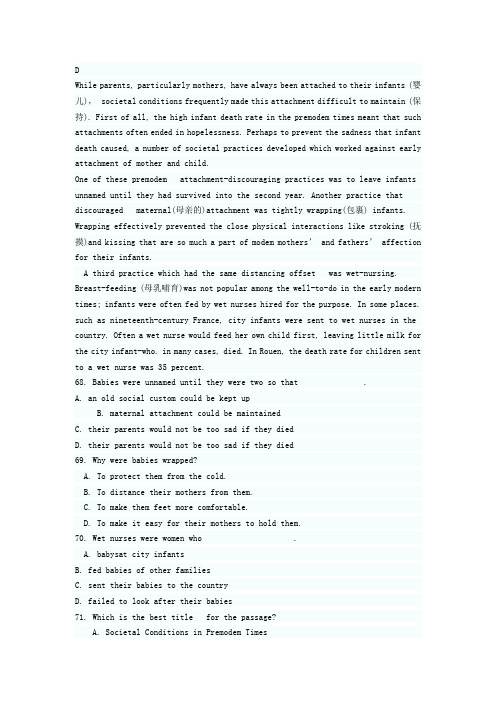
DWhile parents, particularly mothers, have always been attached to their infants (婴儿), societal conditions frequently made this attachment difficult to maintain (保持). First of all, the high infant death rate in the premodem times meant that such attachments often ended in hopelessness. Perhaps to prevent the sadness that infant death caused, a number of societal practices developed which worked against early attachment of mother and child.One of these premodem attachment-discouraging practices was to leave infants unnamed until they had survived into the second year. Another practice that discouraged maternal(母亲的)attachment was tightly wrapping(包裹) infants. Wrapping effectively prevented the close physical interactions like stroking (抚摸)and kissing that are so much a part of modem mothers’ and fathers’ affection for their infants.A third practice which had the same distancing offset was wet-nursing.Breast-feeding (母乳哺育)was not popular among the well-to-do in the early modern times; infants were often fed by wet nurses hired for the purpose. In some places. such as nineteenth-century France, city infants were sent to wet nurses in the country. Often a wet nurse would feed her own child first, leaving little milk for the city infant-who. in many cases, died. In Rouen, the death rate for children sent to a wet nurse was 35 percent.68. Babies were unnamed until they were two so that .A. an old social custom could be kept upB. maternal attachment could be maintainedC. their parents would not be too sad if they diedD. their parents would not be too sad if they died69. Why were babies wrapped?A. To protect them from the cold.B. To distance their mothers from them.C. To make them feet more comfortable.D. To make it easy for their mothers to hold them.70. Wet nurses were women who .A. babysat city infantsB. fed babies of other familiesC. sent their babies to the countryD. failed to look after their babies71. Which is the best title for the passage?A. Societal Conditions in Premodem TimesB. Practices of Reducing Matemal AttachmentC. Poor Health Service and High Infant Death RateD. Differences between Modern and Premodern ParentsEA study published in September suggests there is a surprising way to get people to avoid unhealthy foods change their memories. Scientist Elizabeth Loftus of the University of California at Irvine asked volunteers to answer some questions on their personalities (个性) and fend experiences. “One week later, ” Loftus says,“We told those people we’d fed their answers into our smart computer and it came up with an account of their early childhood experiences. ” Some accounts included one key additional detail (细节):“You got sick after eating strawberry ice-cream. ”The researchers then changed this detail into a manufactured(人为促生的) memory through leading questions—Who were you with? How did you feel? By the end of the muddy. Up to 41% of those given a false memory believed strawberry ice-cream once made them sick. and many said they’d avoid eating it.When Loftus published her findings, she started getting calls from people begging her to make them remember hating chocolate or French fries. Unfortunately, it’s not that easy. False memories appear to work only for foods you don’t cat on a regular hasis, But most important, it is likely that false memories can be implanted (准粉) only in people who are unaware of the mental control. And lying to a patient is immoral, even if a doctor believes it’s for the patient’s benefit.Loftus says there’s nothing to stop parents from trying it with their overweight children. “I say, wake up—parents have been lying about Father Christmas for years, and nobody seems to mind. If they can prevent diseases caused by fatness and all the other problems that come with that, you might think that’s a more moral lie. Decide that for yourself. ”72. Why did Loftus ask the volunteers to answer some questions?A. To improve her computer program.B. To find out their attitudes towards food.C. To find out details she can make use of.D. To predict what food they’ll like in the future.73. What did Loftus find out from her research?A. People believe what the computer tells them.B. People can be led to believe in something false.C. People tend to forget their childhood experiences.D. People are not always aware of their personalities.74. According to the study, people may stop having a certain food if they .A. learn it is harmful for healthB. lie to themselves that they don’t want itC. are willing to let doctors control their mindsD. think they once had a bad experience of eating it.75. What is the biggest concern with the method?A. Whether it is moral.B. Who it is best for.C. When it is effective.D. How it should be used.2006年普通高等学校招生全国统一考试英语(北京卷)第Ⅱ卷(共35分)第四部分 :书面表达(共两节,35分)第一节情景作文(20分)国际文化交流中心将组织一次由各国学生参加的“和平,友爱”夏令营活动,要求报名者提交英文个人简介。
2006年高考英语试题全国卷试题分析
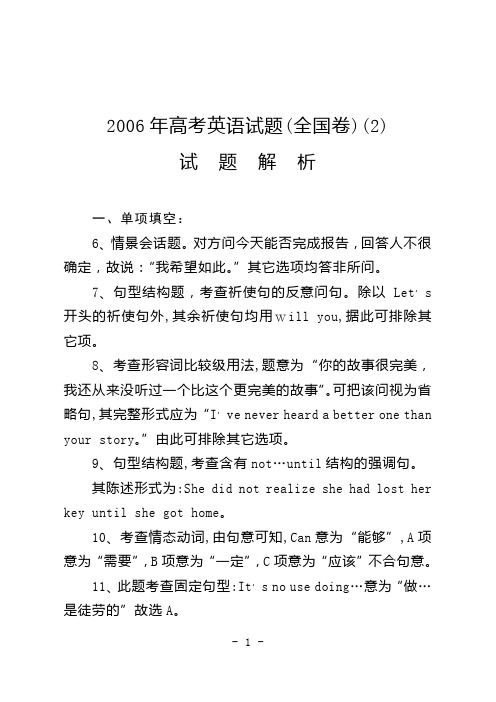
2006年高考英语试题(全国卷)(2)试题解析一、单项填空:6、情景会话题。
对方问今天能否完成报告,回答人不很确定,故说:“我希望如此。
”其它选项均答非所问。
7、句型结构题,考查祈使句的反意问句。
除以Let’s 开头的祈使句外,其余祈使句均用will you,据此可排除其它项。
8、考查形容词比较级用法,题意为“你的故事很完美,我还从来没听过一个比这个更完美的故事”。
可把该问视为省略句,其完整形式应为“I’ve never heard a better one than your story。
”由此可排除其它选项。
9、句型结构题,考查含有not…u ntil结构的强调句。
其陈述形式为:She did not realize she had lost her key until she got home。
10、考查情态动词,由句意可知,Can意为“能够”,A项意为“需要”,B项意为“一定”,C项意为“应该”不合句意。
11、此题考查固定句型:It’s no use doing…意为“做…是徒劳的”故选A。
12、考查动词时态。
由句中其它动词判断,其正确选项应为D项,用过去完成时,意为“比原计划多花了三千美元”。
13、考查句式结构,该句为并列句,while在此意为“然而”,有转折之意。
其它选项不符合句意和结构。
14、考查在具体语境中应用比较级的能力。
问话人想知道对方是否带足了钱,而回答者说,他需要的钱大大超过了他原计划的,为否定回答,故选C。
A项与问句矛盾,B项不符合句意,D相亦与问句矛盾。
15、考查动词词义辨析。
选B项意为“允许”,A项为“禁止”,C项为“听从”,不合句意。
16、复合句引导词考查题。
选D项。
What引导宾语从句,在从句中做宾语,A和C项为疑问副词,不能做宾语,B项that在名词性从句中不做成分。
17、非谓语动词考查题。
选A项,为现在分词短语在句中做伴随状语,C项为不定式,不能做伴随状语,而B和D 项为谓语形式,显然不合适。
2006年全国及各自主命题省市高考英语分类解析(完形填空)

2006年全国及各自主命题省市高考英语分类解析(完形填空)江苏省石庄高级中学:秦建华全国卷I、全国卷II、北京卷、天津卷、上海卷、重庆卷、福建卷、湖北卷、湖南卷山东卷、陕西卷、四川卷、广东卷、江苏卷、辽宁卷、安徽卷、江西卷、浙江卷2006年普通高等学校考试英语全国卷I第二节完形填空(共20小题;每小题1.5分,满分30分)阅读下面短文,从短文所给各题的四个选项(A、B、C和D)中,选出可以填入空白处的最佳选项,并在答题卡上将该项涂黑。
On a hot summer day in late August, I sought shade and a cool drink at a waterfront café on a Greek island. Over a hundred degrees in 36 air. Crowded. Tempers(脾气)of both the tourists and waiters had 37 to meet the situation, making it a rather quarrelsome environment(环境)At the table next to mine sat an attractive, 38 couple, waiting for 39 . They heldHands, whispered, kissed, and laughed. Suddenly they stood, picked up their 40 and steppedtogether 41 the edge of where they were sitting to place the table in the sea water. The manstepped 42 for the two chairs. He politely 43 his lady in the knee-deep water and then sat down himself. All people around laughed and cheered.44 appeared. He paused for just a second, walked into the water to 45 the table and take their 46 , and then walked back to the 47 cheers of the rest of his 48 . Minuteslater he returned carrying a bottle of wine and two glasses. Without pausing, he went 49 into the water to 50 the wine. The couple toasted(祝酒)each other, the waiter and the crowd.And the crowd 51 by cheering and throwing flowers to them. Three other tables 52 to have lunch in the water. The place was now filled with laughter.One doesn’t step into water in one’s best summer clothes. Why not?Customers are not served 53 . Why not?Sometimes one should consider 54 the line of convention(常规)and enjoy 55 to thefullest.36.A.fresh B.cool C.still D.thin 37.A.managed B.expected C.attempted D.risen 38.A.lonely B.curious C.well-dressed D.bad-tempered 39.A.cheers B.service C.attention D.flowers 40.A.metal table B.empty bottle C.chairs D.bags41.A.on B.off C.around D.along 42.A.outside B.forward C.down D.back43.A.led B.seated C.watched D.received 44.A.The manager B.A friend C.A waiter D.The servant 45.A.set B.wash C.remove D.check 46.A.menu B.bill C.food D.order47.A.loud B.anxious C.familiar D.final 48.A.tourists B.customers C.fellows D.assistants 49.A.at last B.in time C.once more D.as well 50.A.change B.drink C.sell D.serve 51.A.replied B.insisted C.agreed D.understood 52.A.prepared B.joined in C.settled up D.continued 53.A.with pleasure B.in the caféC.in the sea D.with wine 54.A.following B.keeping C.limiting D.crossing 55.A.life B.wine C.lunch D.time36.答案:C解析:still作形容词的意思是“不动的,静止的,无声的,寂静的,无风的”,still air表示一点风也没有。
2006年全国高考英语试题及答案(北京卷)

绝密★启用前2006年普通高等学校招生全国统一考试英语(北京卷)本试卷分第Ⅰ卷(选择题)和第Ⅱ卷(非选择题)两部分。
第Ⅰ卷1至16页,第Ⅱ卷17至18页,共150分。
考试时间120分钟。
考试结束后,将本试卷和答题卡一并交回。
注意事项:1. 答题前考生务必分别将答题卡Ⅰ和答题卡Ⅱ上的姓名、准考证号用黑色字迹的签字笔填写,用2B铅笔将准考证号对应的信息点涂黑。
2. 答试卷第Ⅰ卷时,每小题选出答案后,用2B铅笔把答题卡Ⅰ上对应题目的答案选中涂满涂黑,黑度以盖住框内字母为准。
如需改动,用橡皮擦除干净后再选涂其他答案项。
在试卷上答题无效。
3. 答试卷第Ⅱ卷时,必须用黑色笔迹的签字笔按题号顺序答在答题卡Ⅱ的红色框答题区域相对应位置内,未在对应的答题区域内做答或超出答题区域做答均不得分。
在试卷上答题无效。
第Ⅰ卷(选择题共115分)第一部分:听力理解(共两节,30分)第一节(共5小题:每小题1. 5分,共7. 5分)听下面5段对话。
每段对话后有一道小题,从每题所给的A、B、C三个选项中选出最佳选项。
听完每段对话后,你将有10秒钟的时间来回答有关小题和阅读下一小题。
每段对话你将听一遍。
例:What is the man going to read?A. A newspaper.B. A magazine.C. A book答案是A.1. What size does the woman want?A. Size 8.B. Size 10.C. Size 12.2. Where does the conversation take place?A. In a post office.B. In a hotel.C. In a bank.3. Why is the man going to New York?A. To live there.B. To visit a friend.C. To have a vacation.4. What are they going to do?A. Play tennis.B. Go swimmingC. Do some cleaning.5. What is the man doing?A. Making an announcement.B. Making an appointment.C. Making an invitation.第二节(共15小题:每小题1. 5分,共22. 5分)听下面6段对话或独白。
2006年高考英语(北京卷)试题解析

2006年高考英语(北京卷)试题解析单项填空21.A.该题考查形容词比较级,water 和electricity都是不可数名词,其比较级为less;修饰克数名词的比较级用fewer;”旧的,以前的”应用older,指人用elder.意为“年长的”。
22.B.该题通过语境考查介词的用法.句意:我们需要何时付清余额?在九月三十日以前。
In 只有加一段时间才能表示”多长时间以后”,而这里是这一天所以不对;during和within不符合语境,且有中式英语的印记.23.D.该题考查修饰名词的表量的固定词组.24.D.该题通过语境考查代词的用法。
25.A.该题通过语境考查情态动词的用法。
Shall用于第一或第三人称,且往往是疑问句中表示征求意见或请求指示。
Would请求对方为自己作某事;can和might请求允许为自己作某事。
26.B.该题通过语境考查冠词的用法。
句意:我把咖啡杯打翻了,刚好洒在键盘上(说话双方已知的)。
你不应该把饮料放在电脑旁边(表责备,此处泛指一台电脑)27.B.该题通过语境考查时态。
第一句用表计划打算的将来时;关键是第二句要用“从现”,没有一般现在时,故用现在完成时,更强调条件:某事完成才能做某事。
28.D.该题考查非谓语动词.句意:又有好几个新的项目被增加到2008奥运会上.29.C.该题通过语境考查名词性从句.能帮我个忙吗?那得看帮什么忙。
用whatever意思说不通;帮助内容不明确,不存在选择关系。
30.A.该题通过语境考查时态和语态。
由下句的“谢谢”得知:这个工作将为你保留到你回来,应用被动语态。
该句没有必要用过去完成时。
31.C.该题考查定语从句。
句意:每天和多于两杯咖啡的女性比那些没有改习惯的女性得心脏病的可能性要大得多。
32.D. 该题通过语境考查时态.句意:你把钥匙放那儿了?我记得放在椅子上,因为我(刚才)进来的时候电话响了。
“放”的动作发生在过去,而“记得”是我现在的印象。
2006年高考英语试题(北京卷)3

第三部分:阅读理解(共20⼩题,每⼩题2分,共40分)阅读下⾯短⽂,掌握其⼤意,从每题所给的A, B, C, D四个选项中,选出选项,并在答题卡上将该项途⿊。
AHow to make a BudgetMost likely , you aren’t the family breadwinner, But doing a small job or getting a weekly allowance would put some money in your pocket . ForKids and grown –ups alike money is easy to spend. If you aren’t careful. It can be gone in no time being responsible with your money is an important skill to learn-and the sooner you start the better. Whether you spending of saving for something special , creating a budget can help you deal with expenses and plan for the future. All you need are paper and a pencil-and some self-control.First, take a look at our sample monthly budget. Then, use a separate sheet of paper to plan your own. In the first two columns(栏),list your sources(来源) of income and how much you expect to earn from them. In the third and fourth columns. list what you expect to spend your money on and the amount.The left-hand total should be more than or equal to the right-hand total. If it is, you have an effective budget.Budgets are not complex, but sticking to them can be tough. When planning your budget, be realistic about your expenses. If you know that you drop 18 at a movie, don’t write 12 in that space simply because you wish you were spendingless.If you are eyeing a big purchase, such as a 150 skateboard, spend less and save more until you have the total amount. No matter how attractive it may be, avoid spending your saving. One day, you will thank yourself!56. who is the passage written for?A. ChildrenB. ParentsC. BreadwinnersD. Bank manager57. The purpose of making a budget is to help people .A. learn to be realisticB. increaseC. manage their money wellC. test their power of self –control58. what should people do when planning a budget?A. Fill in the expenses as they really are.B. Avoid spending money on expensive thing s.C. Set inside a fixed amount of money as saving s.D. List income and expenses on two pieces of paper59. Which of the follows budget is effective?BI was 9 years old when I found out my father was ill. It was 1994. but I can remember my mother’s words as if it were yesterday. “Kernel, I don’t want you to take food from your father, because he has AIDS. Be very careful when you are around him. ”AIDS wasn’t something we talked about in my country when I was growing up. From then on , I knew that this would be a family secret. My parents were not together anymore . and my dad lived alone . For a while , he could take care of himself . But when I was 12. his condition worsened . My father’s other children lived far away, so it fell to me to took after him.We couldn’t afford all the necessary medicine for him. and because Dad was unable to work . I had no money for school supplies and often couldn’t even buy food for dinner . I would sit in class feeling completely lost , the teacher’s words muffled as I tried to figure out how I was going to manage.I did not share my burden (负担)with anyone . I had seen people reacted to AIDS. Kids laughed at classmates who had parents with the disease . And even adults could be cruel . When my father was moved to the hospital. the nurses would leave his food on the bedside even though he was too weak to feed himself.I had known that he was going to die . but after so many years of keeping his condition a secret . I was completely unprepared when he reached his final days. Sad and hopeless. I called a woman at the nonprofit National AIDS Support. That day , she kept me on the phone for hours . I was so lucky to find someone who cared. She saved my life .I was 15 when my father died. He took his secret away with him. having never spoken about AIDS to anyone. Even me , he didn’t want to call attention to AIDS. I do.60. What does Kernel tell us about her father?A. He had stayed in the hospital since he fell illB. He depended on the nurses in his final days.C. He worked hard to pay for his medication.D. He told no one about his disease.61. What can we learn from the underlined sentence?A. Kernel couldn’t understand her teacher.B. Kernel had special difficulty in hearing.C. Kernel was too troubled to focus on the lesson.D. Kernel was too tired to hear her teacher’s words.62. Why did Kernel keep her father’s disease a secret?A. She was afraid of being looked down upon.B. She thought it was shameful to have AIDS.C. She found no one willing to listen to her.D. She wanted to obey her mother.63. Why did Kernel write the passage?A. To tell people about the sufferings of her father.B. To show how little people knew about AIDS.C. To draw people’s attention to AIDS.D. To remember her father.C“Poor but honest. ” “The deserving(值得帮助的)poor. ”There words always come to my mind when I think of “the poor. ”But I also think of people who. perhaps through alcohol(酒) or drugs. have ruined not only their own lives but also the lives of others in order to give way to their own pleasure. Perhaps alcoholism and drug addiction(上上)really are “diseases. ”as many people say. but my own feeling—based, of course, not on any serious study—is that most alcoholics and drug addicts belong to the “undeserving poor. ”And that is largely why I don’t give spare change to beggars.But surely among the street people there are also some who can rightly be called “deserving. ”Deserving what? My spare change ?Or simple the government’s assistance? It happens that I have been brought up to believe that it is proper to make contributions to charity(慈善机构). but if I give some change to a beggar . am I making a contribution to charity and thereby helping someone . or . am I perhaps simply encouraging someone not to get help ?Or , maybe even worse . am I supporting a cheat?If one believes in the value of private charity. One can either give to needy people or to charitable organizations. In giving to a beggar one may indeed be helping a person who badly needs help. but one cannot be certain that one is giving to a needy person. In giving to an organization, on the other hand, one can feel that one’s money is likely to be used wisely. True, facing a beggar one may feel that this particular unfortunate person needs help at this moment—a cup of coffee or a sandwich—and the need will not be met unless I put my pocket right now. But I have come to think that the beggars whom I meet can get along without my spare change, and indeed perhaps they are actually better off for not having money to buy alcohol or drugs.I know nothing about these beggars, but it’s my impression that they simply prefer begging to working. I am not generalizing about street people. I am talking about the people whom I actually meet. That’s why I do not give “spare change, ”and I don’t think I will in the future.64. What does the author think of beggars who take drugs?A. They should be given a cheek-up.B. They really need money to live.C. They have no pleasure in life.D. They are not worth helping.65. Why doesn’t the author give money to street people?A. He doesn’t think they need help.B. He doesn’t have enough money to give.C. He is not convinced they will use it rightly.D. He believes they can get help from the government.66. In the second paragraph, the author presents his idea by .A. asking questions for people to think aboutB. giving examples to support his argumentC. raising questions and answering themD. expressing his opinions directly67. Which of the following opinions does the author accept?A. Drug addiction is a disease.B. Some street people are poor and needy.C. Most beggars have received enough help.D. Charitable organizations handle money properly.。
2006年高考英语北京卷

35. I can't stand ______ with Jane in the same office. She just refuses _______ talking while she works. A. working ; stopping B. to work ; stopping C. working ; to stop D. to work ; to stop 解析: 解析: C. working ; to stop 考察固定搭配。 表示“ 考察固定搭配。 Stand表示“忍受”, 表示 忍受” stand doing;refuse to do ;
24. --- Which driver was to blame? --- Why, ____! It was the child's fault, clear and simple. He suddenly came out between two parked cars. A. both B. each C. either D. neither 解析: D. neither 解析: 考察不定代词中“两个”的用法, 考察不定代词中“两个”的用法,“两 者均不” 者均不”用neither
ห้องสมุดไป่ตู้
26. --- I knocked over my coffee cup. It went right over ______ keyboard. --- You shouldn't put drinks near _____ computer. A. the ; 不填 B. the ; a C. a ; 不填 D. a ; a 解析: 解析: B. the ; a 的用法。 考察冠词 的用法。判断特指还是泛指
07高考语法连载四_2006年北京卷英语试题单选语法详解111000
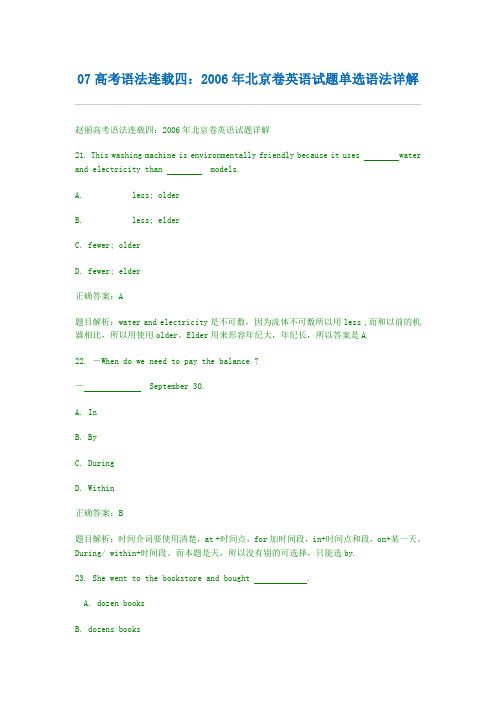
07高考语法连载四:2006年北京卷英语试题单选语法详解赵丽高考语法连载四:2006年北京卷英语试题详解21. This washing machine is environmentally friendly because it uses water and electricity than models.A. less; olderB. less; elderC. fewer; olderD. fewer; elder正确答案:A题目解析:water and electricity是不可数,因为流体不可数所以用less ,而和以前的机器相比,所以用使用older。
Elder用来形容年纪大,年纪长,所以答案是A22. ―When do we need to pay the balance ?― September 30.A. InB. ByC. DuringD. Within正确答案:B题目解析:时间介词要使用清楚,at +时间点,for加时间段,in+时间点和段,on+某一天。
During/ within+时间段。
而本题是天,所以没有别的可选择,只能选by.23. She went to the bookstore and bought .A. dozen booksB. dozens booksC. dozen of booksD. dozens of books正确答案:D题目解析:数量词的表示方式,有数词出现量词不加S,没有数词出现,量词+S并且后面有of.如 two thousand / thousands of a dozen of /dozens of 所以答案为D24. ―Which driver was to blame?―Why ,!It was the child’s fault, clear and simple. He suddenly came out between two parked cars.A. bothB. eachC. eitherD. neither正确答案:D题目解析:因为第二句有between two parked cars所以说是两个人,根据上下文两者都不。
2006年高考试题——英语(北京卷)
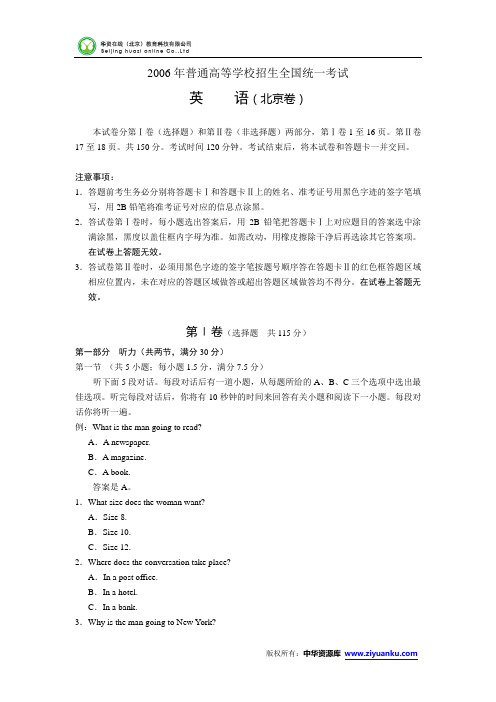
2006年普通高等学校招生全国统一考试英语(北京卷)本试卷分第Ⅰ卷(选择题)和第Ⅱ卷(非选择题)两部分,第Ⅰ卷1至16页。
第Ⅱ卷17至18页。
共150分。
考试时间120分钟。
考试结束后,将本试卷和答题卡一并交回。
注意事项:1.答题前考生务必分别将答题卡Ⅰ和答题卡Ⅱ上的姓名、准考证号用黑色字迹的签字笔填写,用2B铅笔将准考证号对应的信息点涂黑。
2.答试卷第Ⅰ卷时,每小题选出答案后,用2B铅笔把答题卡Ⅰ上对应题目的答案选中涂满涂黑,黑度以盖住框内字母为准。
如需改动,用橡皮擦除干净后再选涂其它答案项。
在试卷上答题无效。
3.答试卷第Ⅱ卷时,必须用黑色字迹的签字笔按题号顺序答在答题卡Ⅱ的红色框答题区域相应位置内,未在对应的答题区域做答或超出答题区域做答均不得分。
在试卷上答题无效。
第Ⅰ卷(选择题共115分)第一部分听力(共两节,满分30分)第一节(共5小题;每小题1.5分,满分7.5分)听下面5段对话。
每段对话后有一道小题,从每题所给的A、B、C三个选项中选出最佳选项。
听完每段对话后,你将有10秒钟的时间来回答有关小题和阅读下一小题。
每段对话你将听一遍。
例:What is the man going to read?A.A newspaper.B.A magazine.C.A book.答案是A。
1.What size does the woman want?A.Size 8.B.Size 10.C.Size 12.2.Where does the conversation take place?A.In a post office.B.In a hotel.C.In a bank.3.Why is the man going to New York?A.To live there.B.To visit a friend.C.To have a vacation.4.What are they going to do?A.Play tennis.B.Go swimming.C.Do some cleaning.5.What is the man doing?A.Making an announcement.B.Making an appointment.C.Making an invitation.第二节(共15小题;每小题1.5分,共22.5分)听下面6段对话或独白。
教育最新2006年高考英语试题及答案(北京卷)
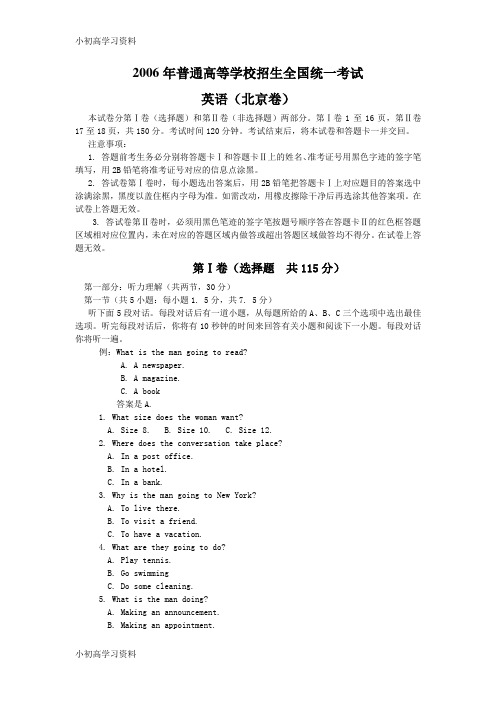
2006年普通高等学校招生全国统一考试英语(北京卷)本试卷分第Ⅰ卷(选择题)和第Ⅱ卷(非选择题)两部分。
第Ⅰ卷1至16页,第Ⅱ卷17至18页,共150分。
考试时间120分钟。
考试结束后,将本试卷和答题卡一并交回。
注意事项:1. 答题前考生务必分别将答题卡Ⅰ和答题卡Ⅱ上的姓名、准考证号用黑色字迹的签字笔填写,用2B铅笔将准考证号对应的信息点涂黑。
2. 答试卷第Ⅰ卷时,每小题选出答案后,用2B铅笔把答题卡Ⅰ上对应题目的答案选中涂满涂黑,黑度以盖住框内字母为准。
如需改动,用橡皮擦除干净后再选涂其他答案项。
在试卷上答题无效。
3. 答试卷第Ⅱ卷时,必须用黑色笔迹的签字笔按题号顺序答在答题卡Ⅱ的红色框答题区域相对应位置内,未在对应的答题区域内做答或超出答题区域做答均不得分。
在试卷上答题无效。
第Ⅰ卷(选择题共115分)第一部分:听力理解(共两节,30分)第一节(共5小题:每小题1. 5分,共7. 5分)听下面5段对话。
每段对话后有一道小题,从每题所给的A、B、C三个选项中选出最佳选项。
听完每段对话后,你将有10秒钟的时间来回答有关小题和阅读下一小题。
每段对话你将听一遍。
例:What is the man going to read?A. A newspaper.B. A magazine.C. A book答案是A.1. What size does the woman want?A. Size 8.B. Size 10.C. Size 12.2. Where does the conversation take place?A. In a post office.B. In a hotel.C. In a bank.3. Why is the man going to New York?A. To live there.B. To visit a friend.C. To have a vacation.4. What are they going to do?A. Play tennis.B. Go swimmingC. Do some cleaning.5. What is the man doing?A. Making an announcement.B. Making an appointment.C. Making an invitation.第二节(共15小题:每小题1. 5分,共22. 5分)听下面6段对话或独白。
2006高考英语试卷(北京)

2006年普通高等学校招生全国统一考试(北京卷)第一节单项填空(共15小题:每小题1分,共15分)21. This washing machine is environmentally friendly because it uses______water and electricity than______ models.A.less; olderB.less; elderC. fewer; olderD. fewer; elder22. ―When do we need to pay the balance ?―_____September 30.A. InB. ByC. DuringD. Within23. She went to the bookstore and bought______ .?A. dozen books B. dozens books C. dozen of books D. dozens of books24. ―Which driver was to blam e?―Why ,_______!It was the child’s fault,clear and simple. He suddenly came out between two parked cars.A. bothB. eachC. eitherD. neither25. ―What’s the name?―Khulaifi.________ I spell that for you?A. ShallB. WouldC. CanD. Might26. ―I knoc ked over my coffee cup. It went right over________ keyboard.―You shouldn’t put drinks near________ computer.A. the; 不填B. the; aC. a; 不填D. a; a27. ―leave at the end of this month.―I don’t think you should do that until________another job.A. I’m going to; you’ve found ?B. I’m going to; you’ve foundC. I’ll; you’d findD. I’ll; you’d find28. There have been several new events________ to the program for the Beijing Olympic Game.A. addB. to addC. addingD. added29. ―Could you do me a favor?―It depends on_______ it is.A. whichB. whichever?C. whatD. whatever30. ―Your job??????? open for your return.―Thanks.A. will be kept ?B. will keep??C. had kept ??D. had been kept?31. Women_______ drink more than two cups of coffee a day have a greater chance of having heart disease than those_______ don’t.A. who; 不填B. 不填; whoC. who; whoD. 不填; 不填32. ―Where did you put the car keys ?―Oh,I_______ put them on the chair because the phone rang as I_____ in.A. remembered; comeB. remembered; was comingC. remember; comeD. remember; was coming33.______ you’ve tried it. you can’t imagine how pleasant it is.A. UnlessB. BecauseC. AlthoughD. When34. He found it increasingly difficult to read,________ his eyesight was beginning to fail.A. andB. forC. butD. or35. I can’t stand______with Jane in the same office. She just refuses____talking while she works.A. working; stoppingB. to work; stoppingC. working; to stop D . to work; to stop第二节?完型填空(共20小题,每小题1. 5分,共30分)Learning to AcceptI learned how to accept life as it is from my father. 36 . He did not teach me acceptance when he was strong and healthy. but rather when he was 37 and ill.My father was 38 a strong man who loved being active,but a terrible illness 39 all that away. Now he can no longer walk. and he must sit quietly in a chair all day. Even talking is40 . One night,I went to visit him with my sisters,we started 41 about life,and I told them about one of my 42 . I said that we must always things up 43 . we grow-our youth. our beauty,our friends-but it always 44 that after we give something up. We gain something new in its place. Then suddenly my father 4 5 up. He said,‖B ut,Peter. I gave up 46 ! What did I gain?‖ I thought and thought,but I could not think of anything to say. 47 . he answered his own question:‖ I 48 the love of my family. ‖ I looked at my sisters,and saw tears in their eyes,along with hope and thankfulness.?I was also 49 me his words. After that ,when I began to fell irritated (愤怒的)at someone.I 50 remember his words and become 51 . If he could replace his great pain with a feeling of live for others. then I should be 52 . to give up my small irritations. In this 53 ,I learned the power of acceptance from my father.? Sometimes I 54 what other things I could learned from him if I had listened more carefully when I was a boy. For now,though,I am grateful for this one 55 .36. A. Afterwards B. Therefore C. However D. Meanwhile37. A. tired B. weak C. poor D. slow38. A. already B. still C. only D. once39. A. took B. threw C. sent D. put40. A. impossible B. difficult C. stressful D. hopeless41. A. worrying B. caring C. talking D. asking42. A. decisions B. experience C. ambitions D. beliefs43. A. as B. since C. before D. till44. A. suggests B. promises C. seems D. requires45. A. spoke B. turned C. summed D. opened46. A. something B. anything C. nothing D. everything47. A. surprisingly B. Immediately C. Naturally D. Certainly48. A. had B. accepted C. gained D. enjoyed49. A. touched B. astonished C. attracted D. warned50. A. should B. could C. would D. might51. A. quiet B. calm C. relaxed D. happy52. A. ready B. likely C. free D. able53. A. case B. form C. method D. way54. A. doubt B. wonder C. know D. guess55. A. award B. gift C. lesson D. word第三部分:阅读理解(共20小题,每小题2分,共40分)AHow to make a BudgetMost? likely ,you aren’t the family breadwinner,But doing a small job or getting a weekly allowance would put some money in your pocket . ForKids and grown –ups alike money is easy to spend. If you aren’t careful. It can be? gone in no time being responsible with your money is an important skill to learn-and the sooner you start the better. Whether you spending of saving for something special ,creating a budget can help you deal with expenses and plan for the future. All you need are paper and a pencil-and some self-control.First,take a look at our sample monthly budget. Then,use a separate sheet of paper to plan your own. In the first two columns(栏),list your sources(来源) of income and how much you expect to earn from them. In the third and fourth columns. list what you expect to spend your money on and the amount.The left-hand total should be more than or equal to the right-hand total. If it is,you have an effective budget.Budgets are not complex,but sticking to them can be tough. When planning your budget,be realistic about your expenses. If you know that you drop?? 18 at a movie,don’t write12 in that space simply because you wish you were spending less.If you are eyeing a big purchase,such as a 150 skateboard,spend less and save more until you have the total amount. No matter how attractive it may be,avoid spending your saving. One day,you will thank yourself!56. who is the passage written for?A.?Children?B. ParentsC. Breadwinners?D. Bank manager57. The purpose of making a budget is to help people???? .A.?learn to be realistic?B. increase?C. manage their money wellD.?test their power of self –control58. what should people do when planning a budget?A.Fill in the expenses as? they really are.B.Avoid spending money on expensive thing s.C.Set inside a fixed amount of money as saving s.D.List? income and expenses on two pieces of paper59. Which of the follows budget is effective?BI was 9 years old when I found out my father was ill. It was 1994. but I can remember my mother’s words as if it were yesterday. ―Kernel,I don’t want you to take food from you r father,because he has AIDS. Be very careful when you are around him. ‖AIDS wasn’t something we talked about in my country when I was growing up. From then on ,I knew that this would be a family secret. My parents were not together anymore . and my dad lived alone . For a while ,he could take care of himself . But when I was 12. his condition worsened . My father’s other children lived far away,so it fell to me to took after him.We couldn’t afford all the necessary medicine for him. and because Dad was unable to work . I had no money for school supplies and often couldn’t even buy food for dinner . I would sit in class feeling completely lost ,the teacher’s words muffled as I tried to figure out how I was going to manage.I did not share my burden (负担)with anyone . I had seen people reacted to AIDS. Kids laughed atclassmates who had parents with the disease . And even adults could be cruel . When my father was moved to the hospital. the nurses would leave his food on the bedside even though he was too weak to feed himself.I had known that he was going to die . but after so many years of keeping his condition a secret . I was completely unprepared when he reached his final days. Sad and hopeless. I called a woman at the nonprofit National AIDS Support. That day ,she kept me on the phone for hours . I was so lucky to find someone who cared. She saved my life .I was 15 when my father died. He took his secret away with him. having never spoken about AIDS to anyone. Even me ,he didn’t want to call attention to AI DS. I do.60. What does Kernel tell us about her father?A.?He had stayed in the hospital since he fell illB.?He depended on the nurses in his final days.C.?He worked hard to pay for his medication.D.?He told no one about his disease.61. What can we learn from the underlined sentence?A.?Kernel couldn’t understand her teacher.B.?Kernel had special difficulty in hearing.C.?Kernel was too troubled to focus on the lesson.D.?Kernel was too tired to hear her teacher’s words.62. Why did Kernel keep her father’s disease a secret?A.?She was afraid of being looked down upon.B.?She thought it was shameful to have AIDS.C.?She found no one willing to listen to her.D.?She wanted to obey her mother.? 63. Why did Kernel write the passage?A.?To tell people about the sufferings of her father.B.?To show how little people knew about AIDS.C.?To draw people’s attention to AIDS.D.?To remember her father.C?―Poor but honest. ‖ ―The deserving(值得帮助的)poor. ‖There words always come to my mind when I think of ―the poor. ‖But I also think of people who. perhaps through alcohol(酒) or drugs. have ruined not only their own lives but also the lives of others in order to give way to their own pleasure. Perhaps alcoholism and drug addiction(上上)really are ―diseases. ‖as many people say. but my own feeling—based,of course,not on any serious study—is that most alcoholics and drug addicts belong to the ―undeserving poor. ‖And that is largely why I don’t give spare change to beggars.But surely among the street people there are also some who can rightly be called―deserving. ‖Deserving what? My spare change ?Or simple the government’s assistance? It happens that? I have been brought up to believe that it is proper to make contributions to charity(慈善机构). but if I give some change to a beggar . am I making a contribution to charity and thereby helping someone . or . am I perhaps simply encouraging someone not to get help ?Or ,maybe even worse . am I supporting a cheat?If one believes in the value of private charity. One can either give to needy people or to charitable organizations. In giving to a beggar one may indeed be helping a person who badly needs help. but one cannot be certain that one is giving to a needy person. In giving to an organization,on the other hand,one can feel that one’s money is likely to be used wisely. True,facing a beggar one may feel that this particular unfortunate person needs help at this moment—a cup of coffee or a sandwich—and the need will not be met unless I put my pocket right now. But I have come to think that the beggars whom I meet can get along without my spare change,and indeed perhaps they areactually better off for not having money to buy alcohol or drugs.?I know nothing about these beggars,but it’s my impression that they simply prefer begging to working. I am not generalizing about street people. I am talking about the people whom I actually meet. That’s why I do not give ―spare change,‖and I don’t think I will in the future.64. What does the author think of beggars who take drugs?A.?They should be given a cheek-up.B.?They really need money to live.C.?They have no pleasure in life.D.?They are not worth helping.65. Why doesn’t the author give money to street people?A.?He doesn’t think they need help.B.?He doesn’t have enough money to give.C.?He is not convinced they will use it rightly.D.?He believes they can get help from the government.66. In the second paragraph,the author presents his idea by??? .A.?asking questions for people to think aboutB.?giving examples to support his argumentC.?raising questions and answering themD.?expressing his opinions directly67. Which of the following opinions does the author accept?A.?Drug addiction is a disease.B.?Some street people are poor and needy.C.?Most beggars have received enough help.D.?Charitable organizations handle money properly.DWhile parents,particularly mothers,have always been attached to their infants (婴儿),societal conditions frequently made this attachment difficult to maintain (保持). First of all,the high infant death rate in the premodem times meant that such attachments often ended in hopelessness. Perhaps to prevent the sadness that infant death caused,a number of societal practices developed which worked against early attachment of mother and child.One of these premodem? attachment-discouraging practices was to leave infants unnamed until they had survived into the second year. Another practice that discouraged? maternal(母亲的)attachment was tightly wrapping(包裹) infants. Wrapping effectively prevented the close physical interactions like stroking (抚摸)and kissing that are so much a part of modem mothers’ and fathers’ affection for their infants.?A third practice which had the same distancing offset? was wet-nursing. Breast-feeding (母乳哺育)was not popular among the well-to-do in the early modern times; infants were often fed by wet nurses hired for the purpose. In some places. such as nineteenth-century France,city infants were sent to wet nurses in the country. Often a wet nurse would feed her own child first,leaving little milk for the city infant-who. in many cases,died. In Rouen,the death rate for children sent to a wet nurse was 35 percent.68. Babies were unnamed until they were two so that??????? .A. an old social custom could be kept upB. maternal attachment could be maintainedC. their parents would not be too sad if they diedD. their parents would not be too sad if they died69. Why were babies wrapped?A. To protect them from the cold.B. To distance their mothers from them.C. To make them feet more comfortable.D. To make it easy for their mothers to hold them.70. Wet nurses were women who?????????? .A. babysat city infantsB. fed babies of other familiesC. sent their babies to the countryD. failed to look after their babies71. Which is the best title? for the passage?A. Societal Conditions in Premodem TimesB. Practices of Reducing Matemal AttachmentC. Poor Health Service and High Infant Death RateD. Differences between Modern and Premodern ParentsEA study published in September suggests there is a surprising way to get people to avoid unhealthy foods change their memories. Scientist Elizabeth Loftus of the University of California at? Irvine asked volunteers to answer some questions on their personalities (个性) and fend experiences. ―One? week later,‖ Loftus says,―We told those people we’d fed their answers into our smart computer and it came up with an account of their early childhood experiences. ‖ Some accounts included one key additional detail (细节):―You got sick after eating strawberry ice-cream. ‖ The researchers then changed this detail into a manufactured(人为促生的) memory through leading questions—Who were you with? How did you feel? By the end of the muddy. Up to 41% of those given a false memory believed strawberry ice-cream once made them sick. and many said they’d avoid eating it. ?When Loftus published her findings,she started getting calls from people begging her to make them remember hating chocolate or French fries. Unfortunately,it’s not that easy. False memories appear to work only for foods you don’t cat on a regular hasis,But most important,it is likely that false memories can be implanted (准粉) only in people? who are unaware of the mental control. And lying to a patient? is immoral,even if a doctor believes it’s for the patient’s benefit.?Loftus says there’s nothing to stop parents from trying it with their overweight children. ―I say,wake up—parents have been lying about Father Christmas for years,and nobody seems to mind. If they can prevent diseases caused by fatness and all the other problems that come with that,you might think that’s a more moral lie. Decide that for yourself. ‖72. Why did Loftus ask the volunteers to answer some questions?A. To improve her computer program.B. To find out their attitudes towards food.C. To find out details she can make use of.D. To predict what food they’ll like in the future.73. What did Loftus find out from her research?A. People believe what the computer tells them.B. People can be led to believe in something false.C. People tend to forget their childhood experiences.D. People are not always aware of their personalities.74. According to the study,people may stop having a certain food if they??????? .A. learn it is harmful for healthB. lie to themselves that they don’t want itC. are willing to let doctors control their mindsD. think they once had a bad experience of? eating it.75. What is the biggest concern with the method?A. Whether it is moral.B. Who it is best for.C. When it is effective.D. How it should be used. 第Ⅱ卷(共35分)第四部分:书面表达(共两节,35分)第一节情景作文(20分)国际文化交流中心将组织一次由各国学生参加的―和平,友爱‖夏令营活动,要求报名者提交英文个人简介。
2006年高考英语试题与参考答案

2006年高考英语试题与参考答案(全国卷Ⅱ)本试卷分第一卷(选择题)和第二卷(非选择题)两部分。
第一卷1至10页。
第二卷11至14页。
考试结束,将本试卷和答题卡一并交回。
第一卷注意事项:1、答第一卷前,考生务必将自己的姓名、准考证号、考试科目涂写在答题卡上。
2、每小题选出答案后,用铅笔把答题卡上对应题目的答案标号涂黑。
如需改动,用橡皮擦干净后,再选涂其他答案标号。
不能答在试卷上。
第一部分英语知识运用(共三节,满分50分)第一节语音知识(共5小题;每小题1分,满分5分)从A、B、C、D四个选项中,找出其划线部分与所给单词的划线部分读音的选项,并在答题卡上将该项涂黑。
例:haveA. gaveB. saveC. hatD. made答案是C。
1.hearA. nearlyB. searchC. bearD. heart2.changeA. machineB. headacheC. techniqueD. research3.surpriseA. policeB. apologizeC. bridgeD. children4.safelyA. baseB. seasonC. AsiaD. usual5.museumA. subjectB. trueC. bulgeD. busy第二节语法和词汇知识(共15小题;每小题1分,满分15分)从A、B、C、D四个选项中,选出可以填入空白处的最佳选项,并在答题卡上将该项涂黑。
例:We _________last night , but we went to the concert instead.A. must have studiedB. might studyC. should have studiedD. would study 答案是C。
6.—Will you be able to finish your report today?—________.A. I like itB.I hope soC. I’ll do soD. I’d love it 7.We forgot to bring our tickets, but please let us enter,________.A. do youB. can weC. will youD. shall we8. Your story is perfect; I’ve never heard _________ before.A. the better oneB. the best oneC. a better oneD. a good one9. It was not until she got home ________ Jennifer realized she had lost her keys.A. whenB. thatC. whereD. before10. We hope that as many people as-possible ________join us for the picnic tomorrow.A. needB. mustC. shouldD. can11. It is no ________arguing with Bill because he will never change his mind.A. useB. helpC. timeD. way12. John, a friend of mine , who got married only last week , spent $3,000 more than he ________ for the wedding.A. will planB. has plannedC. would planD. had planned13. We thought there were 35 students in the dining hall , ________, in fact, there were 40.A. whileB. whetherC. whatD. which14. -Did you take enough money with you?-No, I needed ______ I thought I would.A. not so much asB. as much asC. much more thanD. much less than15. Mary wanted to travel around the world all by herself, but her parents did not _______ her to do so.A. forbidB. allowC. followD. ask16. -What did your parents think about your decision?-They always let me do _____ I think I should.A. whenB. thatC. howD. what17. We often provide our children with toys, footballs or basketballs, _____ that all children like these things.A. thinkingB. thinkC. to thinkD. thought18. There were a lot of people standing at the door and the small girl couldn’t get _______ .A. betweenB. throughC. acrossD. beyond19. I know you don’t like ______ musi c very much. But what do you think of _____ music in the film we saw yesterday?A. 不填;不填B. the;theC. the;不填D. 不填;the20. As you can see, the number of cars on roads ______ rising these days.A. was keepingB. keepC. keepsD. were keeping第三节完型填空(共20小题;每小题1.5分,满分30分)阅读下面短文,从短文后所给各题的四个选项(A、B、C和D)中,选出可以填入空白处的最佳选项,并在答题卡上将该项涂黑。
2006年高考北京卷英语试题及参考答案
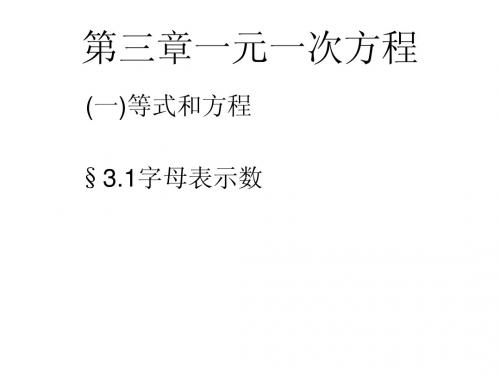
(2)长方形的长为a厘米,宽为b厘 米,长方形的面积是 ab 平方厘米.
巩固练习:
设某数为x,用代数式表示: (1) 比某数的 大1的数; (1+10%)x
(2) 比某数大10%的数;
(3) 某数与
2 5
的和的三倍;
(4) 某数的倒数与5的差.
辩一辩:
下列代数式哪些书写不规范,请改正过来
(1) 3x+1 (4) a b
mn
(2) mn–3 (5) a(b+c)
(3) y 2 (6) a–1b
议一议:
结合你的生活经验对下列代数式作出具体解释: (1)a–b ; (2) ab
解:(1)今年小明b岁、小明爸爸a岁,小明 比他爸爸小(a–b)岁;
2. 在“手拉手”活动中,甲班捐献图书m
本,乙班捐献图书 n 本,那么甲、乙两个 (m + n) 班共捐献图书 __________本.
3. 用35元可以治理祖国大西北的一亩沙地,其中七年级
(1)班有a个学生,七年级(2)班有b个学生,他们
节省平时的零用钱,平均每人捐献的钱,可以治理1亩
(a+b) 沙地,那么他们的捐款一共可以治理_______亩沙地;
赛一赛:
r² (1)圆的半径为r cm,它的面积为______cm² .
(2)长方形的长与宽分别为a cm、b cm,则该长方 形的周长__________cm. 2(a+b) (3)小强在小学六年中共攒了a元零花钱,上中学后 买文具用去b元,剩下的钱全部存入银行,则小 强可以存款___________元. (a–b) (4)某机关原有工作人员 m 人,现精简机构,减少 20%· m 20%的工作人员,则有________人被精简.
2006年北京市高考英语试题分析

2006年北京市高考英语试题分析
闻超
【期刊名称】《中国基础教育》
【年(卷),期】2006(000)004
【总页数】3页(P62-64)
【作者】闻超
【作者单位】北京师范大学良乡附属中学
【正文语种】中文
【中图分类】G633.41
【相关文献】
1.广东省2006年高考英语试题分析 [J], 王兴勇
2.北京市教育委员会北京市纠正行业不正之风办公室北京市监察局北京市发展和改革委员会北京市财政局北京市审计局北京市新闻出版局关于印发2006年北京市治理教育乱收费工作意见的通知 [J],
3.基于中国英语能力等级量表的高考英语试题分析——以2020年高考英语全国卷及新高考Ⅰ卷阅读理解题为例 [J], 栗瑞莲
4.高考英语阅读理解试题分析与教学建议--以2021年高考英语全国卷阅读理解为例 [J], 刘阳;矫兴华
5.高考英语书面表达试题的变迁——以北京市高考英语为例 [J], 冯蕾;高淑芬因版权原因,仅展示原文概要,查看原文内容请购买。
2006年高考英语(北京卷)试题解析
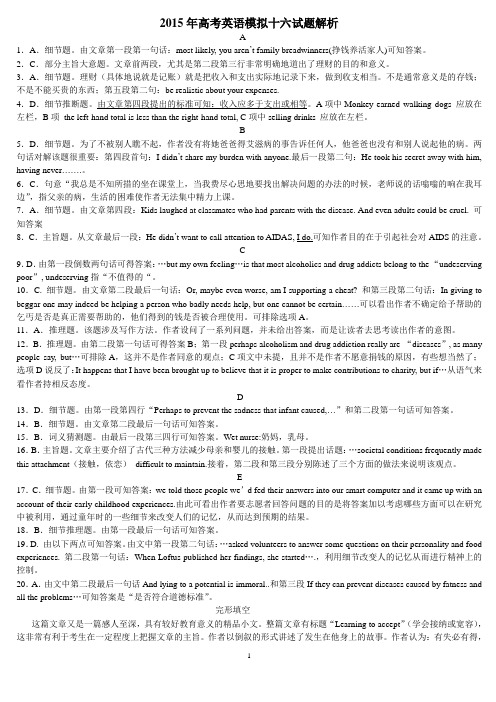
2015年高考英语模拟十六试题解析A1.A.细节题。
由文章第一段第一句话:most likely, you aren’t family breadwinners(挣钱养活家人)可知答案。
2.C.部分主旨大意题。
文章前两段,尤其是第二段第三行非常明确地道出了理财的目的和意义。
3.A.细节题。
理财(具体地说就是记账)就是把收入和支出实际地记录下来,做到收支相当。
不是通常意义是的存钱;不是不能买贵的东西;第五段第二句:be realistic about your expenses.4.D.细节推断题。
由文章第四段提出的标准可知:收入应多于支出或相等。
A项中Monkey earned walking dogs 应放在左栏,B项the left-hand total is less than the right-hand total, C项中selling drinks 应放在左栏。
B5.D.细节题。
为了不被别人瞧不起,作者没有将她爸爸得艾滋病的事告诉任何人,他爸爸也没有和别人说起他的病。
两句话对解该题很重要:第四段首句:I didn’t share my burden with anyone.最后一段第二句:He took his secret away with him, having never…….。
6.C.句意“我总是不知所措的坐在课堂上,当我费尽心思地要找出解决问题的办法的时候,老师说的话嗡嗡的响在我耳边”,指父亲的病,生活的困难使作者无法集中精力上课。
7.A.细节题。
由文章第四段:Kids laughed at classmates who had parents with the disease. And even adults could be cruel. 可知答案8.C.主旨题。
从文章最后一段:He didn’t want to call attention to AIDAS, I do.可知作者目的在于引起社会对AIDS的注意。
2006全国高考英语I真题(附答案)
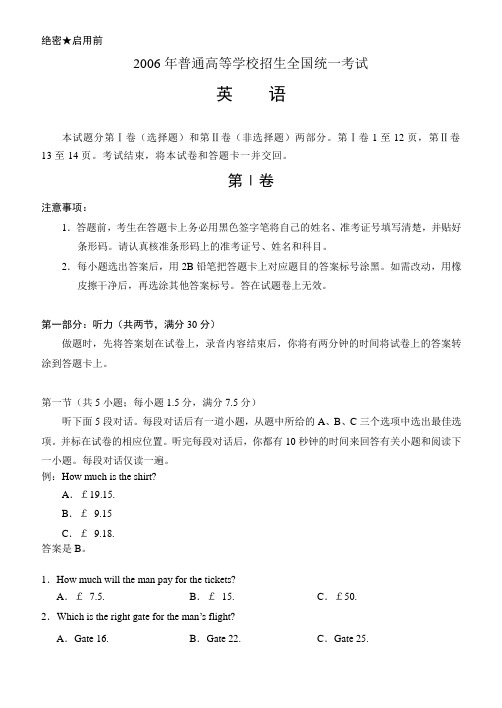
绝密★启用前2006年普通高等学校招生全国统一考试英语本试题分第Ⅰ卷(选择题)和第Ⅱ卷(非选择题)两部分。
第Ⅰ卷1至12页,第Ⅱ卷13至14页。
考试结束,将本试卷和答题卡一并交回。
第Ⅰ卷注意事项:1.答题前,考生在答题卡上务必用黑色签字笔将自己的姓名、准考证号填写清楚,并贴好条形码。
请认真核准条形码上的准考证号、姓名和科目。
2.每小题选出答案后,用2B铅笔把答题卡上对应题目的答案标号涂黑。
如需改动,用橡皮擦干净后,再选涂其他答案标号。
答在试题卷上无效。
第一部分:听力(共两节,满分30分)做题时,先将答案划在试卷上,录音内容结束后,你将有两分钟的时间将试卷上的答案转涂到答题卡上。
第一节(共5小题;每小题1.5分,满分7.5分)听下面5段对话。
每段对话后有一道小题,从题中所给的A、B、C三个选项中选出最佳选项。
并标在试卷的相应位置。
听完每段对话后,你都有10秒钟的时间来回答有关小题和阅读下一小题。
每段对话仅读一遍。
例:How much is the shirt?A.£19.15.B.£9.15C.£9.18.答案是B。
1.How much will the man pay for the tickets?A.£7.5. B.£15. C.£50.2.Which is the right gate for the man’s flight?A.Gate 16. B.Gate 22. C.Gate 25.3.How does the man feel about going to school by bike?A.Happy. B.Tired. C.Worried.4.When can the woman get the computers?A.On Tuesday. B.On Wednesday. C.On Thursday.5.What does the woman think of the shirt for the party?A.The size is not large enough.B.The material is not good.C.The color is not suitable.第二节(共15小题;每题1.5分,满分22.5分)听下面5段对话。
2006年全国高等学校招生考试北京卷书面表达(标准版)

2006年普通高等学校招生全国统一考试英语(北京卷)第Ⅱ卷(共35分)第四部分:书面表达(共两节,35分)第一节情景作文(20分)国际文化交流中心将组织一次由各国学生参加的“和平、友谊”夏令营活动,要求报名者提交英文个人简历。
假设你是王姗,请根据下列信息写一篇个人简历。
注意:1、词数不少于60。
2、可根据内容要点适当增加细节,以使行文连贯。
(请将情景作文写在答题卡II指定区域内)第二节开放作文(15分)请根据下面提示,写一篇短文。
词数不少于50。
You and your Australian friend Jim are visiting a city in China where you see the street sculptures as shown below. You and Jim are discussing what the artist is trying to say. Now you are telling Jim how you understand this piece of art and what makes you think so.提示词:雕塑sculpture笔记本电脑laptop(某城市街头雕塑)(请将情景作文写在答题卡II指定区域内)2006年普通高等学校招生全国统一考试英语(北京卷)参考答案第四部分:书面表达(共两节,35分)第一节情景作文(20分)一、内容要点:1.个人基本信息2.爱好、性格、态度3.参加夏令营的目的二、说明:内容要点可用不同方式表达。
三、One possible version:I’m Wang Shan,a girl of sixteen,presently attending Beijing Yangguang Middle School. I like music,especially classic music. I’m interested in photography because it laaows me to record the beautiful moments in my life.Through my hobbies,I’ve made many friends. In fact,I like meeting new people and enjoy talking with them. Believing we all need help from each other,I appreciate friends’ help,and I’m willing to help anyone in need.I love life;I love Mother Nature;and I love peace. I hate any form of violence.I would like to join the peace & Friendship Camp since it would be a great opportunity to make friends with young people from different countries and learn about their cultures.第二节开放作文(15分)One possible version:I think the artist wants to show changes in the city. The man stands for the old generation in China;he is wearing old-fashioned clothes that date back to the beginning of the twentieth century;heis looking at the laptop in great curiosity,unable to figure out what it is. The girl,on the other hand,is totally different;she has long hair and wears a fashionable short skirt. While the man doesn’t know anything about the laptop,she plays with it skillfully. The striking differences between the two show rapid changes in people’s life in China.。
- 1、下载文档前请自行甄别文档内容的完整性,平台不提供额外的编辑、内容补充、找答案等附加服务。
- 2、"仅部分预览"的文档,不可在线预览部分如存在完整性等问题,可反馈申请退款(可完整预览的文档不适用该条件!)。
- 3、如文档侵犯您的权益,请联系客服反馈,我们会尽快为您处理(人工客服工作时间:9:00-18:30)。
2006年普通高等学校招生全国统一考试英语(北京卷)本试卷分第Ⅰ卷(选择题)和第Ⅱ卷(非选择题)两部分,第Ⅰ卷1至16页。
第Ⅱ卷17至18页。
共150分。
考试时间120分钟。
考试结束后,将本试卷和答题卡一并交回。
注意事项:1.答题前考生务必分别将答题卡Ⅰ和答题卡Ⅱ上的姓名、准考证号用黑色字迹的签字笔填写,用2B铅笔将准考证号对应的信息点涂黑。
2.答试卷第Ⅰ卷时,每小题选出答案后,用2B铅笔把答题卡Ⅰ上对应题目的答案选中涂满涂黑,黑度以盖住框内字母为准。
如需改动,用橡皮擦除干净后再选涂其它答案项。
在试卷上答题无效。
3.答试卷第Ⅱ卷时,必须用黑色字迹的签字笔按题号顺序答在答题卡Ⅱ的红色框答题区域相应位置内,未在对应的答题区域做答或超出答题区域做答均不得分。
在试卷上答题无效。
第Ⅰ卷(选择题共115分)第一部分听力(共两节,满分30分)第一节(共5小题;每小题1.5分,满分7.5分)听下面5段对话。
每段对话后有一道小题,从每题所给的A、B、C三个选项中选出最佳选项。
听完每段对话后,你将有10秒钟的时间来回答有关小题和阅读下一小题。
每段对话你将听一遍。
例:What is the man going to read?A.A newspaper.B.A magazine.C.A book.答案是A。
1.What size does the woman want?A.Size 8.B.Size 10.C.Size 12.2.Where does the conversation take place?A.In a post office.B.In a hotel.C.In a bank.3.Why is the man going to New York?A.To live there.B.To visit a friend.C.To have a vacation.4.What are they going to do?A.Play tennis.B.Go swimming.C.Do some cleaning.5.What is the man doing?A.Making an announcement.B.Making an appointment.C.Making an invitation.第二节(共15小题;每小题1.5分,共22.5分)听下面6段对话或独白。
每段对话或独白后有几道小题,从每题所给的A、B、C三个选项中选出最佳选项。
听每段对话或独白前,你将有5秒钟的时间阅读每小题。
听完后,每小题将给出5秒钟的做答时间。
每段对话或独白你将听两遍。
听第6段材料,回答第6至7题。
6.Who is this announcement for?A.People on a train.B.People on a plane.C.People in a restaurant.7.What time of the day is it?A.Morning.B.Noon.C.Evening.听第7段材料,回答第8至9题。
8.Where are the speakers?A.At a Lost and Found.B.At a bus stop.C.In a shop.9.Which of the following is the woman’s coat?听第8段材料,回答第10至11题。
10.What are the speakers doing?A.Watching a movie.B.Having dinner.C.Making soup.11.What makes the man unhappy?A.The woman doesn’t cook very well.B.The woman seldom talks to him at dinner.C.The woman watches too many commercials.听第9段材料,回答第12至14题。
12.What does the man dislike about his job?A.Working in a hotel.B.Working in summer.C.Traveling all the time.13.Why doesn’t he want to take the new job?A.He doesn’t get a good pay.B.He dislikes working in a seaside town.C.He hates playing the same piece again and again. 14.What does the woman think of the job the man was offered?A.Boring.B.Well-paid.C.Tough.听第10段材料,回答第15至17题。
15.What are they discussing?A.What to have for lunch.B.Where to go for lunch.C.When to have lunch.16.What can we learn about the man?A.He usually doesn’t eat fast food.B.He often eats in a restaurant near his home.C.He can’t afford an expensive lunch that day. 17.Where are they probably going right after this conversation?A.A supermarket.B.A fast-food place.C.A French restaurant.听第11段材料,回答第18至20题。
18.Why didn’t the woman go to the man’s birthday party?A.She forgot all about it.B.She didn’t like the man.C.She didn’t know about it.19.Who is the woman?A.The man’s friend.B.The man’s mother.C.The man’s secretary.20.What does the woman want to do for the man’s birthday?A.Buy him a nice present.B.Have lunch with him.C.Send him an email.第二部分:知识运用(共两节,45分)第一节单项填空(共15小题;每小题1分,共15分)从每题所给的A、B、C、D四个选项中,选出可以填入空白处的最佳选项,并在答题卡上将该项涂黑。
例:It’s so nice to hear from her again _____, we last met more than thirty years ago.A.What’s more B.That’s to sayC.In other words D.Believe it or not答案是D21.This washing machine is environmentally friendly because it uses _____ water and electricity than _________ models.A.less; older B.less; elderC.fewer, older D.fewer; elder22.-When do we need to pay the balance?-__________ September 30.A.In B.ByC.During D.Within23.She went to the bookstore and bought _________.A.dozen books B.dozens booksC.dozen of books D.dozens of books24.-Which driver was to blame?-Why, ________! It was the child’s fault, clear and simple. He suddenly came out between two parked cars.A.both B.eachC.either D.neither25.-What’s the name?-Khulaifi. ________ I spell that for you?A.Shall B.Would C.Can D.Might26.-I knocked over my coffee cup. It went right over __________ keyboard.-You shouldn’t put drinks near _________ computer.A.the; 不填B.the; a C.a; 不填D.a; a27.-_______ leave at the end of this month.-I don’t think you should do that until _________ another job.A.I’m going to; you’d found B.I’m going to; you’ve foundC.I’ll; you’ll find D.I’ll; you’d find28.There have been several new events _______ to the program for the 2008 Beijing Olympic Games.A.add B.to addC.adding D.added29.-Could you do me a favor?-It depends on ______ it is.A.which B.whichever C.what D.whatever30.-Your job _______ open for your return.-Thanks.A.will be kept B.will keep C.had kept D.had been kept 31.Women _______ drink more than two cups of coffee a day have a greater chance of having heart disease than those ________ don’t.A.who; 不填B.不填; whoC.who; who D.不填; 不填32.-Where did you put the car keys?-Oh, I ______ I put them on the chair because the phone rang as I _______ in.A.remembered; come B.remembered; was comingC.remember; come D.remember; was coming33._______ you’ve tried it, you can’t imagine how pleasant it is.A.unless B.Because C.Although D.When34.He found it increasingly difficult to read, ______ his eyesight was beginning to fail.A.and B.for C.but D.or35.I can’t stand _______ with Jane in the same office. She just refuses ______ talking while she works.A.working; stopping B.to work; stoppingC.working; to stop D.to work; to stop第二节完形填空(共20小题;每小题1.5分,共30分)阅读下面短文,掌握其大意,从每题所给的A、B、C、D四个选项中,选出最佳选项,并在答题卡上将该项涂黑。
